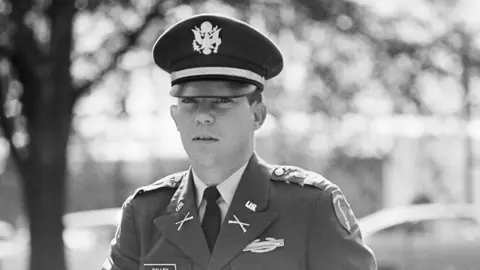Former US officer behind My Lai massacre dead at 80
 Getty Images
Getty ImagesA former US officer who was the only person to be convicted in connection with the My Lai massacre during the Vietnam War has died, according to reports.
William Calley died on 28 April at the age of 80, the Washington Post and New York Times reported, citing official death records.
Calley led the US Army platoon that carried out the mass murder of hundreds of civilians, including women and children, in the Vietnamese village of Son My in 1968.
He was sentenced to life in prison in 1971 for killing 22 civilians, but only served three days behind bars after then-President Richard Nixon ordered his release under house arrest.
The My Lai massacre, known as the Son My massacre in Vietnam, is considered among the worst war crimes in American military history. The killings shocked the US public at the time and galvanised the anti-Vietnam war movement.
According to the Vietnamese government, 504 people were killed in the massacre.
Calley, a junior college dropout from South Florida, enlisted in the army in 1964.
He was quickly promoted to junior officer and then second lieutenant, at a time when the US army was desperate for soldiers.
On the morning of 16 March 1968, Calley’s unit was airlifted to a hamlet in Son My - known to US soldiers at the time as My Lai 4 - on a mission to search and kill Viet Cong members and sympathisers.
When they arrived, the officers were met with no resistance from the residents of the village, who were found cooking breakfast over outdoor fires, according to a 1972 report by journalist Seymour Hersh in the New Yorker.
Mr Hersh reported that Calley and his unit proceeded to kill the civilians in the following hours. Many were rounded up in small groups and shot, he said. Others were pushed into a drainage ditch and shot, or were killed in or near their homes.
Women and girls were raped by American officers and then murdered, Mr Hersh reported.
The massacre was initially covered up but became public a year and a half later, thanks in large part to Mr Hersh’s reporting, which earned him a Pulitzer Prize.
Calley was one of 26 soldiers who were charged with criminal offences and the only one convicted.
His conviction polarised Americans. Some deemed him a war criminal while others felt the junior officer was used as a scapegoat to shift blame for a massacre that was ultimately the responsibility of his superiors.
While he was given a life sentence, Calley only served three-and-a-half years under house arrest after President Nixon commuted his sentence.
Calley married Penny Vick, the daughter of a jewelry store owner in Columbus, Georgia, in 1976. The couple had one son, William Laws Calley III, and divorced in the mid-2000s.
He rarely spoke about his role in the My Lai massacre and had refused to sit down with historians and reporters.
In 2009, he apologised while speaking to the Kiwanis Club of Greater Columbus.
“There is not a day that goes by that I do not feel remorse for what happened that day in My Lai,” he said. “I feel remorse for the Vietnamese who were killed, for their families, for the American soldiers involved and their families.”
The Washington Post first reported Calley’s death on Monday, after receiving a tip from a Harvard Law School graduate who uncovered it in public records.
No cause of death has been cited.
